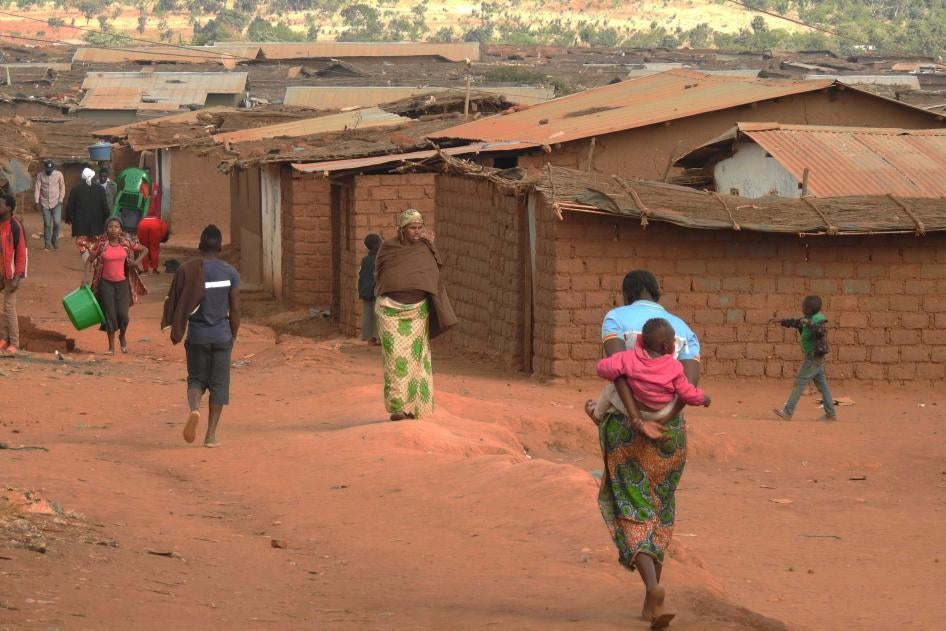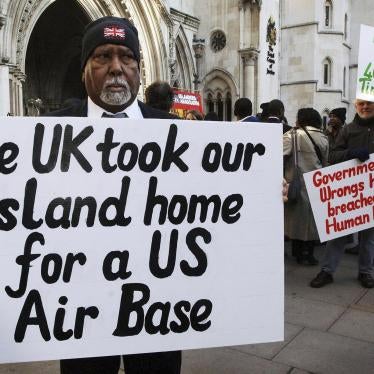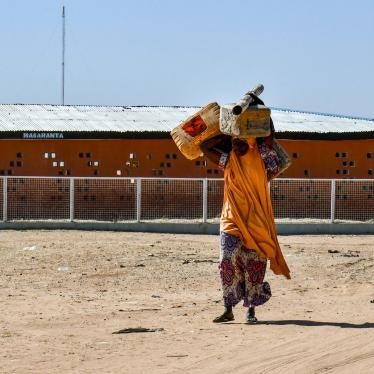(Johannesburg) – The Malawian government is jeopardizing refugee rights at Dzaleka refugee camp by expelling an important refugee rights group, Human Rights Watch said today. INUA Advocacy had been providing independent scrutiny of the human rights situation at the camp, which is about 40 kilometers from Lilongwe, the capital.
The media reported that the Malawian Ministry of Homeland Security wrote to INUA Advocacy in November 2023 to terminate its partnership with the group, ordering it to vacate Dzaleka camp. The partnership had permitted INUA Advocacy to have offices within the camp.
“Malawi authorities should stop targeting those exposing abuses against refugees and advocating for refugee rights,” said Idriss Ali Nassah, senior Africa researcher at Human Rights Watch. “INUA Advocacy and other organizations demanding respect for human rights and accountability in the treatment of refugees should be allowed to operate without fear of being deregistered or targeted by the authorities.”
The chief executive officer of INUA Advocacy, Innocent Magambi, told Human Rights Watch that the Homeland Security Ministry did not give a reason for ending the partnership. He believes the authorities acted because of the organization’s advocacy around human rights violations that refugees and asylum seekers have suffered during and after the forced relocations to Dzaleka camp in 2023.
In May, the police, aided by the military, began rounding up thousands of refugees and asylum seekers across Malawi, temporarily detaining them in prisons, then relocating them to Dzaleka camp. This followed a March 27 government directive to enforce its encampment policy, which restricts the freedom of movement of refugees and asylum seekers by requiring them to live in the camp.
Some of those arrested reported beatings and destruction or theft of their property. INUA Advocacy and other groups published a statement in August demanding a halt to the forced relocations and deportations of refugees and asylum seekers. The groups called for accountability, including the arrest and prosecution of those involved in stealing or other abuses.
INUA Advocacy has also spotlighted the dire living conditions inside Dzaleka camp, which is run by the government with support from the United Nations Refugee Agency (UNHCR). In May, UNHCR had asked the authorities in Malawi to rescind the relocation decision, noting the insufficient health services, water, shelter, and sanitation facilities in the camp, as well as the overcrowded schools. UNHCR also noted that Dzaleka camp currently hosted more than 50,000 people, though it was originally designed for a capacity of 12,000.
In June, President Lazarus Chakwera committed to improving the living conditions and overall well-being of refugees in the country. The government also pledged to uphold human rights in its treatment of refugees and asylum seekers.
However, the hardships brought about by the encampment policy have resulted in some refugees opting to leave Malawi. In October, over 100 Burundians had left Malawi in what UNHCR said were voluntary repatriations. The community leader of the Burundian refugees told the media that some of those leaving had decided to do so due to limited resources at Dzaleka camp.
A 26-year-old Rwandan woman with two children, all recognized refugees, told Human Rights Watch that she and her husband, also a Rwandan refugee, had moved out of Dzaleka camp about eight years ago to set up a grocery shop and agriculture business in Lilongwe. When armed police raided their home in May during the enforcement of the encampment policy, the family lost their business and their home.
At Dzaleka camp, where the family arrived empty handed, she was separated from her husband and housed in a tent with her children and several other women. Her children, ages 5 and 7, are out of school because the classrooms in the camp are full.
Despite their destitute living situation, the woman said she had no option but to stay in Malawi, where she had lived virtually her entire life. She said she was only 3 years old when her mother fled Rwanda and brought her to Malawi.
“I don’t know anything about the country where I was born,” she said. “My mother died in this camp, leaving just my brother and me. So, tell me, where will I go? The authorities are saying we could return to our countries if we wish, but even if I returned to Rwanda, who would show me where to go? I don’t know anyone there and wouldn’t even know where to start from.”
Malawi is party to both the 1951 UN Refugee Convention and the 1969 OAU Refugee Convention. Malawi expressed reservations when it ratified the 1951 Convention, stating it considered certain provisions “as recommendations only and not legally binding,” including refugees’ rights to freedom of movement, employment, property, and public education.
Malawi is also party to the UN Convention on the Rights of the Child and the African Charter on the Rights and Welfare of the Child, both of which uphold the right of refugee children to an education as well as other rights.
In 2018, Malawi endorsed the UN Global Compact on Refugees, which builds on the Comprehensive Refugee Response Framework. These instruments recognize the importance of integrating refugees into the population and the respect for their socioeconomic rights, also highlighting that access to education and labor markets promotes refugee self-reliance and contributes to local economies.
Malawi’s 1989 Refugee Act provides for procedures to determine refugee status but does not address the rights of refugees. INUA Advocacy has lobbied for amending the law requiring refugees to live in the camp indefinitely and to enshrine refugees’ rights to freedom of movement, work, and education.
“The Malawian government should fulfill its expressed commitment to respect refugee rights and improve their living conditions, and not obstruct the important work of civil society groups defending these rights,” Nassah said. “The government should collaborate with local and international rights organizations, ensure their access to Dzaleka refugee camp, and end its encampment policy.”
Malawi: Rights Group Expelled from Refugee Camp
Ensure Civil Society Access to Dzaleka; Uphold Refugee Rights
Your tax deductible gift can help stop human rights violations and save lives around the world.
Topic
Most Viewed
-
December 16, 2015
Syria: Stories Behind Photos of Killed Detainees

-
December 16, 2015
If the Dead Could Speak

-
October 16, 2012
Death of a Dictator

-
August 29, 2024
South Korea’s Digital Sex Crime Deepfake Crisis

-
December 8, 2024
A New Dawn for Syria





